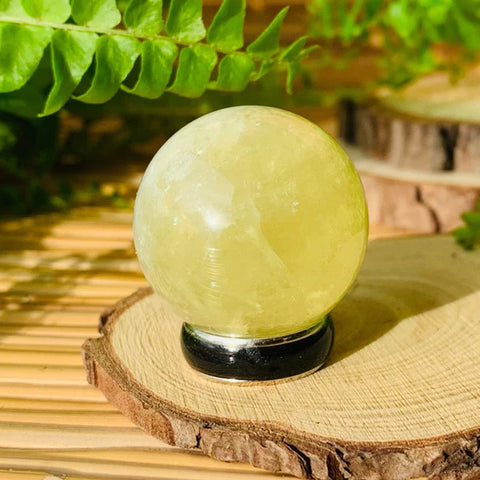8 Things You Didn’t Know About Citrine
More crystal meanings on our blog at www.crystalgemstones.net
Citrine, the stone of the sun, mastering our creativity center and tapping into infinite stores of energy. The name Citrine actually comes from the Greek translation to Citron. Many civilizations have known this gorgeous yellow stone as Citrion, French for “Lemon”, often using the name when referring to various other types of quartz crystal like topaz, jade, aventurine, and varieties of beryl. There’s no official record of when or where citrine was officially first discovered, and it can be found virtually anywhere in the world, but some of the richest sources have come out of Brazil, Sri Lanka, India, and Madagascar. Not so commonly known is the fact that this stone bears a deep connection to Mother Earth and, as we are working with its energies, opens and aligns the lower chakras to keep us grounded. Citrine taps into our energy centers of vitality, inner power, and personal will. As it unlocks our deepest desires, it provides a spark of imagination that makes projects of all sorts seem more possible than ever. All this in consideration, here are 8 things you didn’t know about Citrine.
1. Citrine, Power in Ancient Cultures
In ancient times, people strongly believed in many of the stone’s metaphysical powers and benefits, that it could calm bad tempers, balance the emotional body, and manifest one’s deepest desires. To harness these powers, the ancient Egyptians would use citrine in talismans, the ancient Greeks would carve important images on them, and the Romans (especially priests) would wear them as rings.
2. Citrine, the Stone of Love, Attraction, and Fertility
Throughout history, many superstitions and beliefs surround this attractive stone of the Sun. Some legends say that it would help women become more fertile and increase their happiness while others say that it made men more handsome and attractive to potential lovers. Citrine was also said to instill confidence and healing wisdom while carrying a piece of the stone would attract true love and prevent heartbreak. Most common of all these beliefs was that citrine is the only stone which doesn’t hold on to negative energy, but instead repels it.
3. Citrine, a Stone of Good fortune
Considering its many great qualities, it’s no wonder this stone was seen as a token of good luck and success. It was even called “the Merchant’s stone” because it was believed to attract good fortune in trades, business, and overall financial situations. Citrine is still widely used today across many cultures for the purpose of attracting abundance.
4. Citrine in Physical Healing
Throughout history, many associations exist between citrine and physical healing. It was often carried for protection against snake venom, although the methods for its use are a bit unclear. It was also said to relieve back aches and pain, possibly by placing the stone on the affected area of the back. Today, citrine is said to positively affect the kidneys, digestive tract, liver, and muscles.
5. Citrine in the Bible
In the Roman Catholic and Latin versions of the Old Testament, citrine is referred to as the Greek word chrysolitus meaning “gold stone”. The Breastplate of Aaron, or the Breastplate of Judgement, as we’ve mentioned in previous articles, was often attached to the Priest’s ephod in the early years after Christ. It was said to be the design of God and inlaid with 12 stones, each of a different significance. Often seen as topaz in earlier times, citrine was believed to be the third stone on the third row of crystals on the breastplate, representing the tribe of Gad who stands for “luck and good fortune”.
6. Citrine in Chinese Culture
Throughout the ages, citrine has been revered for its amazingly beneficial qualities by many cultures and civilizations around the world. Its association with good luck originated in ancient China, where they called it “the stone of success”. Ancient Chinese emperors often wore the stone as they believed it would broaden the expanses of the mind and increase their intellectual capabilities. Today, in modern Chinese schools citrine is often used by professors during lectures and by students to help them pass exams. It is also commonly used to produce thoughts of abundance during Chinese crystal healing sessions.
7. Citrine and Goddesses
With its many attributes and uses throughout history, perhaps the official origins of citrine sit within two different cultures and are associated with two divine deities. In Greek mythology, citrine is associated with Demeter, the Goddess of harvest who represents productivity and yield in crops. It is also associated with Sekhmet, the ancient Egyptian Goddess of war and power.
8. Citrine, an Elixir
Many of the physical attributes of citrine revolve around the vital organs of the body and is also very beneficial when made into an elixir. Many believe that soaking a citrine stone in pure water creates an elixir which aids in detoxifying the blood. This elixir is said to be highly beneficial to the female reproductive system, assisting in the relief of menstrual cramps and menopausal symptoms.
Meditating with citrine is best done outside at dawn or dusk, when the energies of the earth are at its strongest in relation to the sun. Hold the stone in both hands and absorb its energies, speaking to the universe through it of what it is you truly want and need.
Birthstone: November
Zodiac: Aries, Gemini, Leo, Libra
Planet: Jupiter, the Sun
Chakras: Root, Sacral, Solar Plexus, Third Eye
Element: Air, Fire
Vibration Number: 6
Healing Properties: happiness, creativity, prosperity, strength, vitality, energy, truth, spiritual growth





